

20+ helpful professional development resources for teachers. As a teacher, we encourage our students to never stop learning.

But what about us? Do we try to learn new things or do we stick to the same teaching patterns every day, month, year? In this blog post, I’ll show you some handy website for teachers to develop their teaching skills. Professional development is necessary in every job. (85) Obvious to you. Amazing to others. - by Derek Sivers. Professional Development Isn’t Just for Teachers. When it comes to professional development, most of us think about the tools and techniques needed to train teachers.
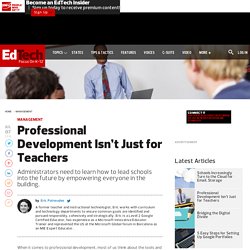
However, professional development for administrators is just as important, if not more so. Instead of learning about the ins and outs of teaching roles, administrators would benefit from professional development focused on changing human behaviors and transforming organizational culture. A principal’s ability to lead change is critical. That change must be modeled and championed at the principal level. An example of poor leadership that comes to mind is the principal who directs a staff meeting, then passes out printed versions of the meeting agenda and notes after the meeting is over. Hacking Education: The Pineapple Chart. Hacking Education Welcome to the next post on our #D100BloggerPD series on Hacking Education: 10 Quick Fixes for Every School.
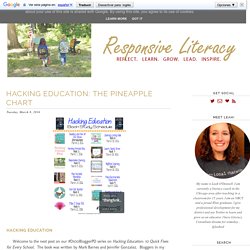
8 Steps To Flipped Teacher Professional Development. How To Help Teachers Create Their Own Professional Development by Terry Heick Traditional teacher professional development depends on external training handed down to teachers after having identified their weaknesses as a professional.
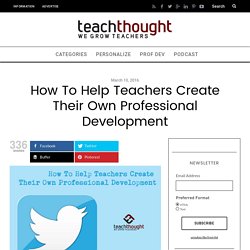
If you’re not so great at teacher writing, or if assessment is becoming a bigger focus in your school or district, you fill out a growth plan of some sort, attend your training, get your certificates, and repeat until you’ve got your hours or your school has run out of money to send you to more training. Oftentimes these “professional growth plans” are scribbled out in 15 minute meetings with your principal, then “revisited” at the end of the year as a kind of autopsy. What would happen if we flipped this model on its head?
The idea here isn’t simply that educators can improve by connected through social networks–they already are doing that. Personalizing for Teacher Needs. The idea of personalization in education abounds in so many ways.
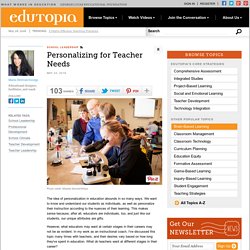
We want to know and understand our students as individuals, as well as personalize their instruction according to the nuances of their learning. This makes sense because, after all, educators are individuals, too, and just like our students, our unique attributes are gifts. How To Plan Outstanding Tech Training For Your Teachers. Listen to this post as a podcast: Podcast: Play in new window | Download (Duration: 18:27 — 25.7MB) Subscribe: iTunes | Android | I recently got an email from a guy who had just been hired as a tech specialist for a school district.
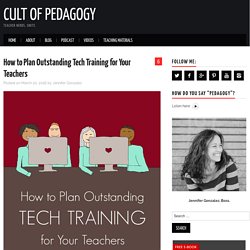
My First Micro-credential. Posted by Nancy Barile on Saturday, 03/19/2016 Last year I was asked me to teach a graduate level course called “Documenting and Assessing Student Learning” at the college where I work (in addition to being a high school ELA teacher).
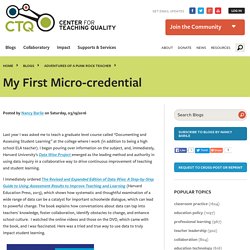
I began pouring over information on the subject, and, immediately, Harvard University’s Data Wise Project emerged as the leading method and authority in using data inquiry in a collaborative way to drive continuous improvement of teaching and student learning. Five Ways to Create More Teacher Rockstars in Your School. “Rockstar” is a term that is being thrown around among educators lately.

A few teachers and administrators who try new instructional practices—many that inevitably involve tech tools—earn that rockstar praise from their connected colleagues online. But, teachers are driven by the same thing at their core: they want to do what is best for kids. If that is true, then they all deserve to feel like rockstars! They all deserve to feel the rush of knowing that they took a risk and it paid off in their classrooms. Here are five ways school leaders can create a culture that motivates all teachers in your school to take a risk and try something new. Who's the Best Deliverer of Teacher PD? Report Says Teachers Still Lack Input #teaching. The major momentum behind micro-credentials. New partnerships and pioneers are giving Digital Promise’s badging movement a new push Educators are, by definition, continuous learners.
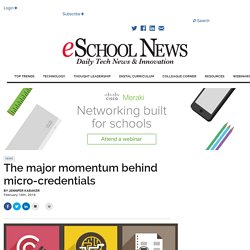
They spend their careers striving to become better practitioners, whether through formal professional development activities like workshops and in-service days, or informal engagements like Twitter chats, EdCamps, and virtual coaching and communities. The major momentum behind micro-credentials. An Unlikely Group Forms Unified Vision for the Future of Education. Education has long been a hotly debated issue and with good reason — the policies and actions of education leaders affect our nation’s children, the future of the workforce and the day-to-day lives of families.
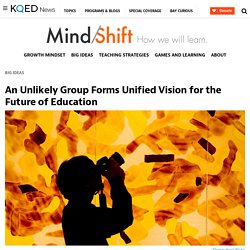
But the struggle to improve the system has often left advocates in distinct camps, each believing that their solution, whether it be charter schools or blended learning or investing in teachers, is the best way to improve learning. That’s why it’s surprising to see a group of high-profile but strange bedfellows putting forward a new vision for learning, which they’re calling Education Reimagined.
“People really wanted to get together to reimagine the fundamental system, recognizing that a whole lot of money has gone into trying to fix the system with no real results,” said Kelly Young, spokesperson for Education Reimagined. “We help people come in as people, not institutions, and they begin to see each other as part of the solution instead of as part of the problem,” Young said. Pinterest: Emerging trends in education.
Why Don’t We Differentiate Professional Development? As I prepare for another afternoon of district-provided professional development activities, I always make sure that I bring plenty of work to do (papers to grade, lesson planning, etc.). This isn't because I have a bad attitude and hate professional development (PD). A great PD event can really energize me to improve my classroom instruction. However, the sad fact is that the majority of PDs I attend are repetitive, simplistic, or downright boring. 3 Brain Basics for the Middle Grades Classroom. By Curtis Chandler I may not be a brain expert, but as an educator, I am in the brain business. Like many other teachers out there, I am trying to uncover as much as I can about learning and cognition in order to better understand and serve my students.
That’s why I counted myself lucky when I was asked to teach a night class on adolescent development, cognition, and understanding. Not necessarily because I had so much to say on the subject, but because it gave me a chance to thumb through my old Ed Psych notes, read up on the latest research in cognition, and order a stack of new books with the Amazon gift card that has been sitting in my wallet for 2 years. What I discovered were a few guiding principles – some new and some already known – that helped fine-tune the design and delivery of my middle school lessons. 8 ways teachers can talk less and get kids talking more. If you do fewer teacher-directed activities, that means the kids will naturally do more talking, doesn’t it? Not necessarily. I have often found myself talking almost constantly during group work and student-directed projects because I’m trying to push kids’ thinking, provide feedback, and help them stay on task.
How to Spark Curiosity in Children Through Embracing Uncertainty. In the classroom, subjects are often presented as settled and complete. Teachers lecture students on the causes of World War I, say, or the nature of matter, as if no further questioning is needed because all the answers have been found. In turn, students regurgitate what they’ve been told, confident they’ve learned all the facts and unaware of the mysteries that remain unexplored. Without insight into the holes in our knowledge, students mistakenly believe that some subjects are closed. They lose humility and curiosity in the face of this conceit. But our collective understanding of any given subject is never complete, according to Jamie Holmes, who has just written a book on the hidden benefits of uncertainty. Report: Teacher-Controlled Video Observations Improve Teacher Assessment Process.
Report: Teacher-Controlled Video Observations Improve Teacher Assessment Process Teachers who participated in a year-long study comparing video-recorded and in-person classroom observations found the video observation process fairer and more useful overall than in-person observations, according to a new report from the Center for Education Policy Research (CEPR) at Harvard University. The report, "The Best Foot Forward Project: Substituting Teacher-Collected Video for In-Person Classroom Observations," summarizes the findings of the first year of implementation of the Best Food Forward Project.
The researchers studied 347 teachers and 108 administrators at schools in Delaware, Georgia, Colorado and California. Center for Education Policy Research at Harvard University. Article on Rigor - Edutopia. Know Your Terms: Memory Palace. Why the Best Teachers Won't Ditch the Lecture. 11 Amazing Sources for Online Professional Development for Teachers. Effective PD. Highly effective classrooms can result from highly effective professional development. Teachers: Know When to Stop Talking. Published Online: July 28, 2015.